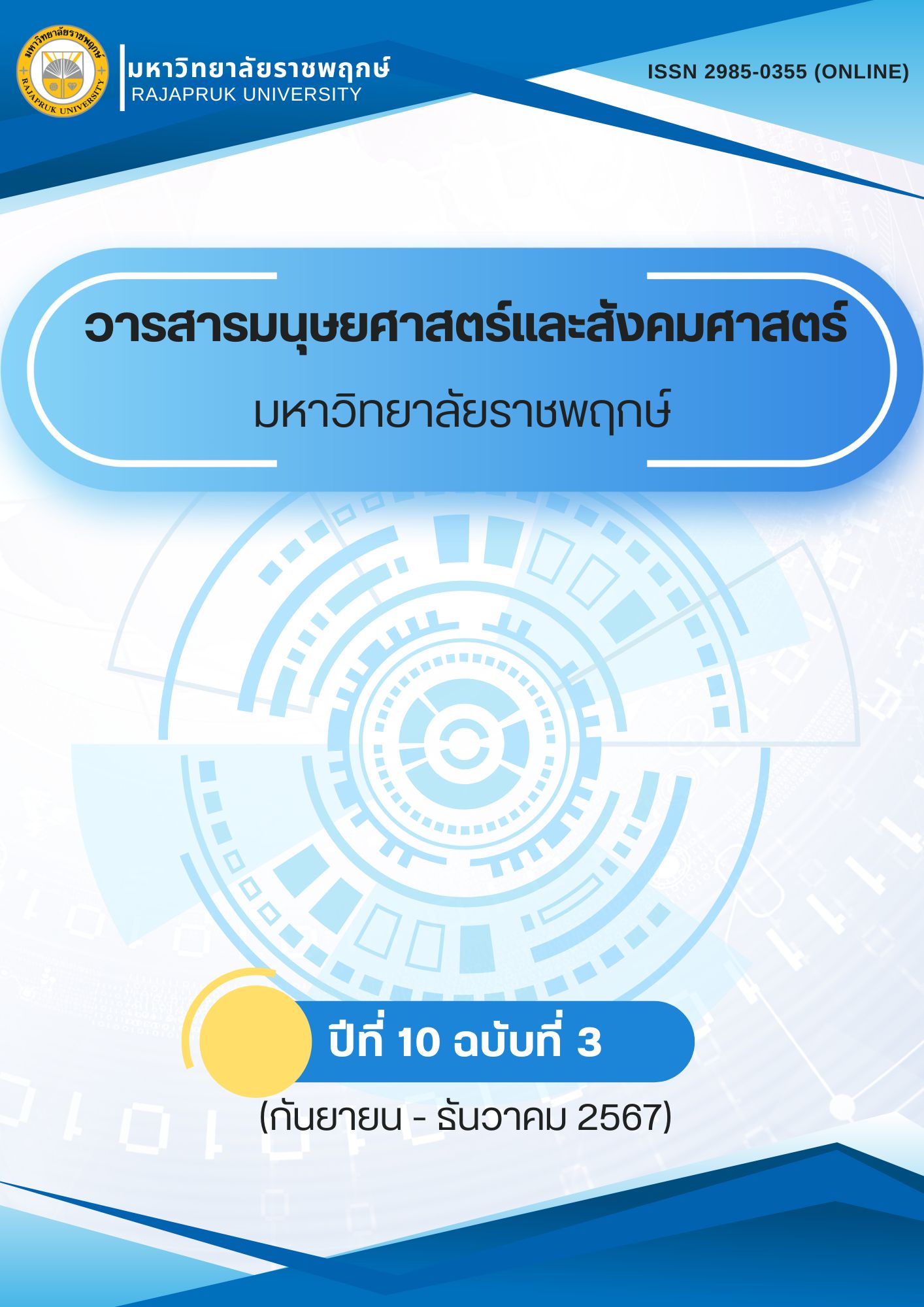Guidelines for Designing Souvenirs from Silk of Ban Nong Bo, Nong Bo Subdistrict, Mueang District, Ubon Ratchathani Province
Main Article Content
Abstract
This research aims to 1) study the demand for souvenirs made from silk of Ban Nong Bo, Nong Bo Subdistrict, Mueang District, Ubon Ratchathani Province, 2) assess the satisfaction with the design of souvenirs made from silk of Ban Nong Bo, Nong Bo Subdistrict, Mueang District, Ubon Ratchathani Province, and 3) study for designing souvenirs from silk of Ban Nong Bo, Nong Bo Subdistrict, Mueang District, Ubon Ratchathani Province. Mixed research methods are used in this study. Interviews and small group discussions are used for qualitative research. The samples are 60 representatives of the weaving community enterprise of Nong Bo Subdistrict, representatives of souvenir shop, representatives of tourists, and representatives of product design experts. Questionnaires are used to collect data for quantitative research. The samples are 400 representatives of the weaving community enterprise of Nong Bo Subdistrict, representatives of souvenir shop, representatives of tourists, and representatives of product design experts. Data are analyzed using frequency distribution, percentage, mean, and standard deviation.
The research results found that 1) the demand for souvenirs made from silk of Ban Nong Bo were phone cases, phone strap, shoes, phone bags, and phone holders. 2) For the satisfaction assessment of the design of souvenirs made from silk, it was found that overall satisfaction was at a moderate level ( =3.32, SD=0.66) Considering each aspect, it was found that the production process represented ( =3.55, SD=0.64) and the transportation represented ( =3.54, SD=0.77) The convenience of use represented ( =3.45, SD=0.65) and the beauty represented ( =3.41, SD=0.66) The safety represented ( =3.36, SD=0.77) and the price represented ( =3.24, SD=0.67) The maintenance and repair represented ( =3.22, SD=0.59) and the durability represented ( =3.20, SD=0.60) The material represented ( =3.19, SD=0.65) and the function represented ( =3.13, SD=0.67) 3) study for designing souvenirs made from silk included production process, transportation, convenience of use, beauty, safety, and reasonable price.
Article Details
References
เจษฎาวุฒิ บุตรเพชร, จุฑามาส ชมผา และ สุปิยา ทาปทา. (2561). รูปแบบการสร้างมูลค่าเพิ่มผลิตภัณฑ์ หัตถกรรมผ้าไหมไทยในเขตพื้นที่ภาคตะวันออกเฉียงเหนือ. วารสารรมยสาร, 16(2): 196-210.
นริสรา ลอยฟ้า. (2563). การเพิ่มมูลค่าสินค้าและเพิ่มช่องทางการตลาดผ่านระบบพาณิชย์อิเล็กทรอนิกส์ ของกลุ่มวิสาหกิจชุมชนทอผ้าไหมลายลูกแก้ว ตำบลนิคมพัฒนา อำเภอขุขันธ์ จังหวัดศรีสะเกษ. วารสารการพัฒนาชุมชนและคุณภาพชีวิต, 8(1): 214–226.
ตวงรัก รัตนพันธุ์ และ ชัชวาลย์ รัตนพันธุ์. (2560). การออกแบบของที่ระลึก: การประยุกต์ใช้ภูมิปัญญาท้องถิ่นสู่ผลิตภัณฑ์ชุมชน. วารสารนาคบุตรปริทรรศน์ มหาวิทยาลัยราชภัฏนครศรีธรรมราช, 9(1): 1-4.
บุญชม ศรีสะอาด. (2535). การวิจัยเบื้องต้น. พิมพ์ครั้งที่ 2. กรุงเทพฯ: สุวีริยาสาส์น.
ประเสริฐศรี ส่งเสริม. (2566). ความต้องการผลิตภัณฑ์ของที่ระลึกจากผ้าไหมบ้านหนองบ่อ ตำบลหนองบ่อ อำเภอเมือง จังหวัดอุบลราชธานี. สัมภาษณ์เมื่อวันที่ 28 กันยายน 2566.
สุวิมล ติรกานันท์. (2557). ระเบียบวิธีวิจัยทางสังคมศาสตร์ : แนวทางสู่การปฏิบัติ. พิมพ์ครั้งที่ 12. กรุงเทพฯ: โรงพิมพ์แห่งจุฬาลงกรณ์มหาวิทยาลัย.
สุรีย์ เข็มทอง. (2566). ธุรกิจสินค้าที่ระลึก. ค้นเมื่อวันที่ 11 กันยายน 2566, จากhttps://www.smeleader.com/files/business_plan/business_plan_souvenir_shop03.pdf
สิทธิชัย สมานชาติ. (2553). หัตถกรรมทอผ้าไหมบ้านหนองบ่อ ผ้าไหมงามลายประสาทผึ้งหัวจกดาว. ค้นเมื่อวันที่ 11 กันยายน 2566, จาก http://www.esanpedia.oar.ubu.ac.th/esaninfo/?p=737
องค์การบริหารส่วนตำบลหนองบ่อ อำเภอเมือง จังหวัดอุบลราชธานี. ค้นเมื่อวันที่ 14 สิงหาคม 2566 จาก https://www.nong-bo.go.th/about-us/history?fbclid
อังกาบ บุญสูง. (2561). การออกแบบบรรจุภัณฑ์รองเท้าผ้าไหมแบรนด์วาลีดีไซด์ จังหวัดอุตรดิตถ์. วารสารวิชาการคณะเทคโนโลยีอุตสาหกรรม: เทพสตรี I-TECH, 13(2): 130-137.
Ha Vy Vu. (2022). Local Handicrafts as Authentic Tourism Souvenirs Enhancing Cultural Values Through Storytelling Case: Finnish Lapland. Lapland University of Applied Sciences.
Nunnally, J. C. (1978). Psychometric Theory. New York: McGraw-Hill Book Company.


